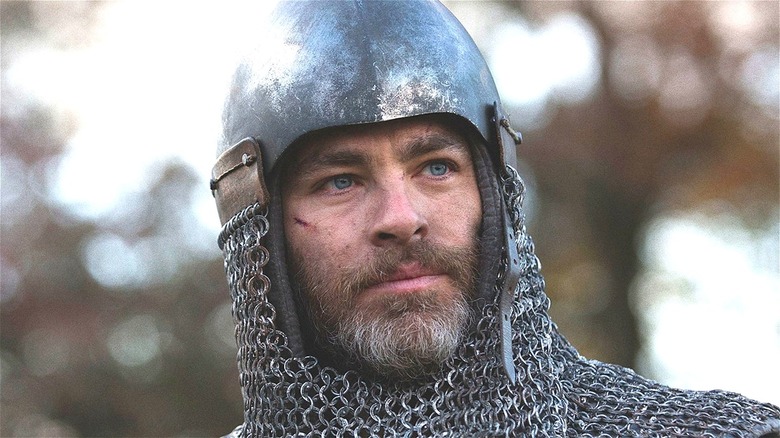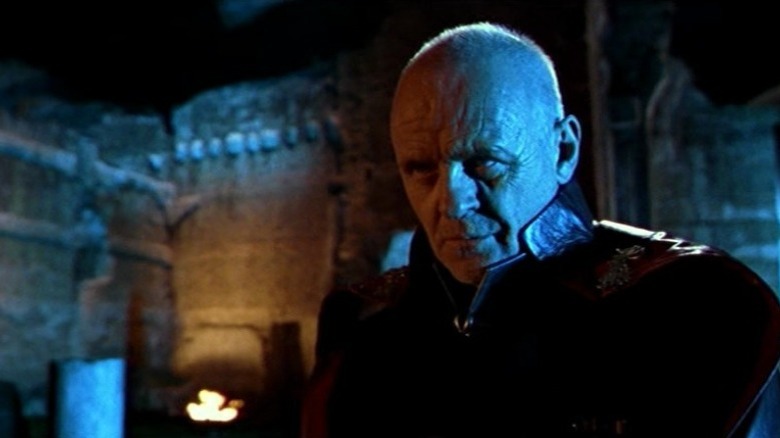The Movie Like Outlaw King That Historical Action Fans Need To See
Scottish filmmaker David Mackenzie has had an interesting career. After many years as one of the U.K.'s most consistent indie directors, with multiple British Independent Film Award nominations under his belt, he made a somewhat unsuccessful attempt to cross over to the U.S. with the critically panned Ashton Kutcher comedy "Spread." Then, in 2013, he earned newfound notoriety in North America, but with a British production — the rough-hewn, intensely acclaimed prison drama "Starred Up." This was followed by "Hell or High Water," a Best Picture Oscar nominee, which confirmed Mackenzie as a new A-list talent in Hollywood. That prominence allowed him to get a passion project, "Outlaw King," off the ground.
Though the Chris Pine-starring historical epic was ultimately controversial, winning over some Netflix viewers with its style, intensity, and sense of scale, while alienating others with the sheer gruesomeness and relentlessness of its violence, everyone who's seen it can attest to Mackenzie's fervor. "Outlaw King" has more fire than ten average biopics combined, and its dive into the historical setting — Robert the Bruce's medieval Scotland, during the guerrilla campaign against England — is unbridled, with a degree of texture and grit that betokens Mackenzie's deployment of the $120 million budget to make Scotland's answer to "Andrei Rublev" (via The Playlist).
If you count yourself among the fans of that daring vision, there's another controversial historical action movie you might be primed to appreciate.
Titus is an appropriately bombastic adaptation of Shakespeare's most violent play
William Shakespeare is synonymous with great drama, and his most famous tragedies are unimpeachable fixtures of the Western literary canon. But there's one Shakespeare work that's widely held to be a little below the standard of the others: "Titus Andronicus," the Bard's first tragedy, which tells the tale of a Roman army general's quest for revenge. For many years, filmmakers mostly stayed away from the bloody, bombastic play, opting to bring to the screen more respected Shakespearean texts like "Othello" and "Hamlet." In fact, "Titus Andronicus" wasn't given a proper cinematic rendering until Julie Taymor made "Titus."
The American director, who earned her stripes in opera and theater, had no trouble reaching into what she saw as the essence of Shakespeare's most maligned brainchild: grandeur, high camp, self-awareness, and cackling excess. Released in 1999 as Taymor's film directing debut, "Titus" was, much like "Outlaw King," panned by many for its gruesomeness and nonexistent restraint, as well as Taymor's liberal sprinkling of anachronisms and historical inaccuracies throughout the film — something seen as normal in theater, but still considered "wrong" by most filmgoers.
Perhaps as a result of that incongruity, the movie did poorly at the box office (via Box Office Mojo) and took years to gain the critical reassessment it so richly deserved. Since then, however, the film's bold creative risks, Taymor's visual and aural flair, and the go-for-broke performances of the Anthony Hopkins-led cast have crystallized "Titus" as a cult classic. It is now often held to be one of the best Shakespeare adaptations of all time (via IndieWire), as well as one of the most forcefully and explosively cinematic.

